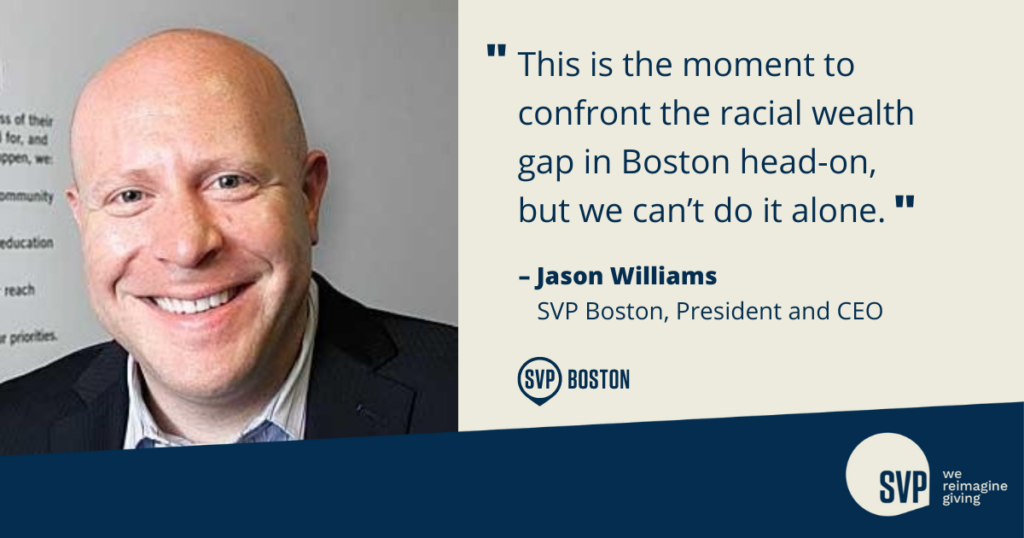Closing the Racial Wealth Gap in Boston Through Social Innovation
Jason Williams, SVP Boston
Jason Williams, President and CEO of SVP Boston, is acutely aware of the issues his city faces.
“We have one of the worst racial wealth gaps in the country,” he says. “We urgently need more financial resources and partners to expand our impact.”
Williams and the team at SVP Boston are pioneering a new model of social change to bolster BIPOC-led nonprofits.
SVP Boston is “being more assertive in supporting BIPOC-led organizations,” Williams explains. Their flagship grant provides $100,000 over three years to emerging groups.
Learn why SVP Boston’s model is sparking enthusiasm – and urgency – in our discussion with him below.

Can you give us a quick overview of the racial wealth gap in Boston?
Studies show the average wealth of white families in Boston is $247,000, whereas it’s $12,000 for Black Caribbeans and close to $0 for African Americans and Dominicans – only 5% of that of white households here. In Boston, 44% of White residents own homes, compared to 30% of Black residents and only 17% percent of Latino residents. This gap has actually expanded since the banning of redlining in 1968, and the disparity persists through generations, as homeownership and property ownership are some of the quickest ways to close the wealth gap.
How is SVP Boston approaching this issue?
We believe in innovative social change and have strengthened local nonprofits for 20+ years. Recently, we revamped our approach to target increasing economic mobility and racial equity specifically.
We developed a framework centered on food security, housing access, and education for workforce development. And given Boston’s enormous racial wealth gap, we knew we must be more assertive in supporting BIPOC-led groups. Our flagship grant now provides $100,000 over three years, plus 500+ consulting hours, exclusively to emerging BIPOC-led nonprofits. It’s critically important for us that the leaders of the groups we work with have lived experience related to the issues that we’re focusing on. Who’s going to understand the true depth of those issues than someone who has gone through the very experiences we’re attempting to address?
Can you provide an example of the impact?
We’ve seen remarkable outcomes.
One example is the Leadership Brainery, an organization focused on addressing inequities in access to advanced degrees and workforce leadership opportunities for underrepresented groups. They work with current and future college students, academic organizations, employers, and community members to address and get rid of systemic barriers to education.
Their work really ties into SVP Boston’s focus on the racial wealth gap in the city, because, according to the Pew Research Center, household heads with a master’s degree have a median household income of $117,400. The median incomes of those holding professional and doctoral degrees are $162,100 and $142,300, respectively. Leadership Brainery notes that Black students represent less than 6% of incoming master’s and doctoral students at research institutions. By breaking down the barriers underrepresented communities have faced in the past with increased resources, access to inclusive networks, and advanced education, talented individuals can harness impactful and higher-wage careers. This, in turn, enables them to establish financial stability and reinvest in their communities, creating generational prosperity.
In their second year as an SVP grantee partner, Leadership Brainery completed a comprehensive 5-year strategic plan for growth, which involved coordinated effort over nine months with the LB team, volunteers from three SVP corporate partners, and a number of Partners from SVP Boston. The funding SVP Boston provided empowered LB to expand their presence beyond our city and really make a foothold on the national level.
How does the demand for funding and support compare to what SVP Boston has to give?
The need far outweighs availability. Our latest grant cycle had 30+ applicants vying for one slot. I wish we could fund more, but our constraints allow just one annual lead grantee. However, in the future, microgrants are going to be a critical part of our equity-focused approach.
For semi-finalists, we’ll be providing targeted microgrants of $2,500 during the initial stage, accompanied by 3-6 months of pro-bono capacity-building support. The three finalists will receive $5,000 microgrants, as well as 3-6 months of pro-bono capacity building and consultative support. And instead of providing $75,000 split over three years to the lead grantee, as we used to, now they’ll receive the same amount split over two years to really jumpstart their work. Additionally, there’s an opportunity for an alumni-only third year with an additional $25,000 based on tangible opportunities for impact, raising their grant to a full $100,000. It’s an evolving model, and we’re excited about the potential effect it can have.
What are the next steps for growing impact?
The good news is the broader nonprofit community here recognizes the importance of our approach. We have strong brand awareness and plenty of interest from potential grantees. What we urgently need now are more financial resources and partners to expand our impact. With more support, we can increase our grantmaking and ability to drive systemic change in economic mobility and racial equity in Boston. We have the expertise, the passion, and the plan. We need more people willing to invest in this vision and the potential of BIPOC-led nonprofits. This is the moment to confront the racial wealth gap in Boston head-on, but we can’t do it alone.
You can join Jason and SVP Boston in this critical work by donating or becoming a partner today. Together, we can build a more just and equitable city for all. Learn more about being part of the solution at www.svpboston.org/donate.


